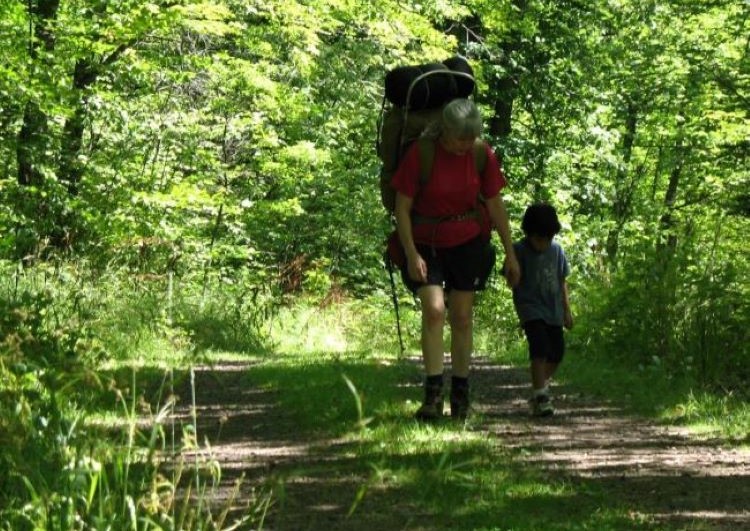Post-teaching, post-mothering, post-midlife ... and, hey, the pandemic! Who will I be now?
Monday, September 2, 2019
Self-Less, Self-Full: A Tale of Two Grandmas
Grandma 1:
Once in while I’d stroke Grandma Burkey’s cheek, soft as the leather of my old deerskin purse. She was tiny at 4’10”. She’d be wearing a dress that fit snugly over her round body, perched on a chair with her hands folded in her lap.
Like most grandmas, she came with a repertoire of food: shoo-fly pie, funnel cakes, Dutch potato filling, apple dumplings, fastnachts. She was best known for her “Easter Eggs”: melted dark chocolate laced with paraffin, poured over freshly-ground coconut, wrapped around peanut butter. These four or five inch long delectables had to be stored in the refrigerator so the paraffin wouldn’t melt; we drooled over them for days, waiting for Easter.
One day, when she was babysitting, she glanced up at the ceiling and said, “There’s Ishkabibble.” I squinted but couldn’t see anything. He must be very small, I reasoned. It made me think of Timmy, when he tied a string to the leg of a housefly and it buzzed circles in the air.
Grandma Burkey was nice, never wished to complain. She sat in the rocking chair that took up most of the tiny living room of her government-subsidized apartment, knitting and crocheting afghans and doilies and teapot cozies and Christmas ornaments and little dolls. Only once did I see a crack in her pleasant self-effacement: when my little sister painted herself and our hardwood floors with permanent India ink. Grandma muttered with fury as she scrubbed her down in the tub.
Grandma Burkey never made it past 8th grade. She was probably relieved when her husband, a domineering alcoholic, died of a heart attack at 40—she never dated or married again. When the doctor told her an artery in her brain was poised to burst, she entered a nursing home, occupying one half of a vinyl-floored room. She hated her roommate but relished her role as the queen of the craft room and favorite of the staff.
She lived in the nursing home for another 30 years. She was 92 when she died.
Grandma 2:
Isn’t this beautiful? Grandma Slack picked up an eggplant and held it up in the air. It was beautiful: its graceful curves, its deep black-brown-purple sheen.
Grandma and Grandpa would get up at dawn, drive the tractor out into the misty field behind the house, and pick sweet corn for the market, keeping the pile of green ears moist with wet burlap sacks.
Grandma did everything Grandpa did: drove the tractor, sprayed the crops, plowed the fields, baled the hay, and groomed the horses—as well as cleaning, sewing, canning, and cooking vast amounts of food for the farm hands. She was an excellent cook: could make a casserole of whipped squash so fragrant, sweet, and buttery that even the children would ask for more. I’ve never had a better apple pie than the ones she made from the tart green apples of their own orchard—we’’d pick them straight from the tree and eat them with salt.
After my grandfather’s death, she drove a semi from Michigan to Pennsylvania to bring us a Hammond organ she thought we needed. The man at the tollbooth took a long look and drawled, “You’re the prettiest truck driver I’ve seen in a long time.”
Still, we had a tendency to recede, to shrink, when Grandma Slack was around. She was constantly critical, leaving my mother anxious and flustered. All she does is read, she’d tell my mother when I curled up in a chair with a book. She should be helping you with those dishes. She complained that she should have been a nurse, that she had a gift for soothing the sick. Decades after her death, I read through the journals she kept as a young woman, the few years before and after her marriage. She had clearly loved her first job—sterilizing glassware for the chemistry lab at a pharmaceutical company, enjoying the company of the other “girls.” She asked whether she could continue to work at the lab after she got married. They said no.
Grandma Slack did not ascribe to the notion that women must be docile and selfless. If anyone receded in their marriage, it was Grandpa, who worked from dawn to dusk; he never smiled and seldom spoke. Still, against her own example, she cautioned me once: You better stop being so independent, or you’ll never get a man. Maybe she had paid a price for her refusal to be subordinate. Not long after my grandfather had died, I heard her tell my mother: I don’t really know what love is.
Is humble self-effacement another word for powerlessness? Does defiance and self-assertion mean a forfeiture of love? It’s easy to say the answer is somewhere in the middle. But how does one assert the self and relinquish the self at the same time? I find it hard to sit in the not-knowing.
Subscribe to:
Post Comments (Atom)
Featured Post
Forging the Second Self: A memoir in progress.
Forging the Second Self: Post-Teaching, Post-Mothering, Post-Midlife: Who Will I Be Now? Part I.: Who Am I Now? When I see myself a...

No comments:
Post a Comment